Bali Travel Guide: 20 Things to know before visiting Bali
Bali is undoubtedly one of the most visited destinations in the world. In this Bali travel guide, I will cover 20 things to know before visiting Bali, Indonesia. These, in my opinion are the main things that will keep you informed on everything Bali related.
1. Entry requirements to Bali
The no 1 thing is to check if you require a visa to visit Indonesia. For UK and US passport holders, you don’t need a visa prior to entry. You can get a 30 day tourism visa on arrival. We paid 500 000 IDR for the visa on arrival which is about £25. The fee is payable by card (which we did) or cash. Your visa is stamped on arrival. For passport validity, you need 6 months after the date you arrive and 2 blank pages as well.
The government website provides all the information for UK passport holders which gets updated regularly. The Indonesian government has also recently introduced a Bali tourist levy for anyone visiting Bali. It cost 150 000 IDR* which is about £8. This can be paid on arrival or online.
2. Religion
Bali is predominantly Hindu which is interesting as other parts of Indonesia are mainly Muslim. Bali’s religion is a mix of traditional Hinduism and their ancient indigenous beliefs as well. Even though they only make up a small population in Indonesia, their religion has been preserved through the years and even forms a part of their culture.
There are Temples everywhere in Bali and our guide told us that most families have their Temples built in their homes as well. Bali is super religious and each morning, they present mini offerings to their gods.
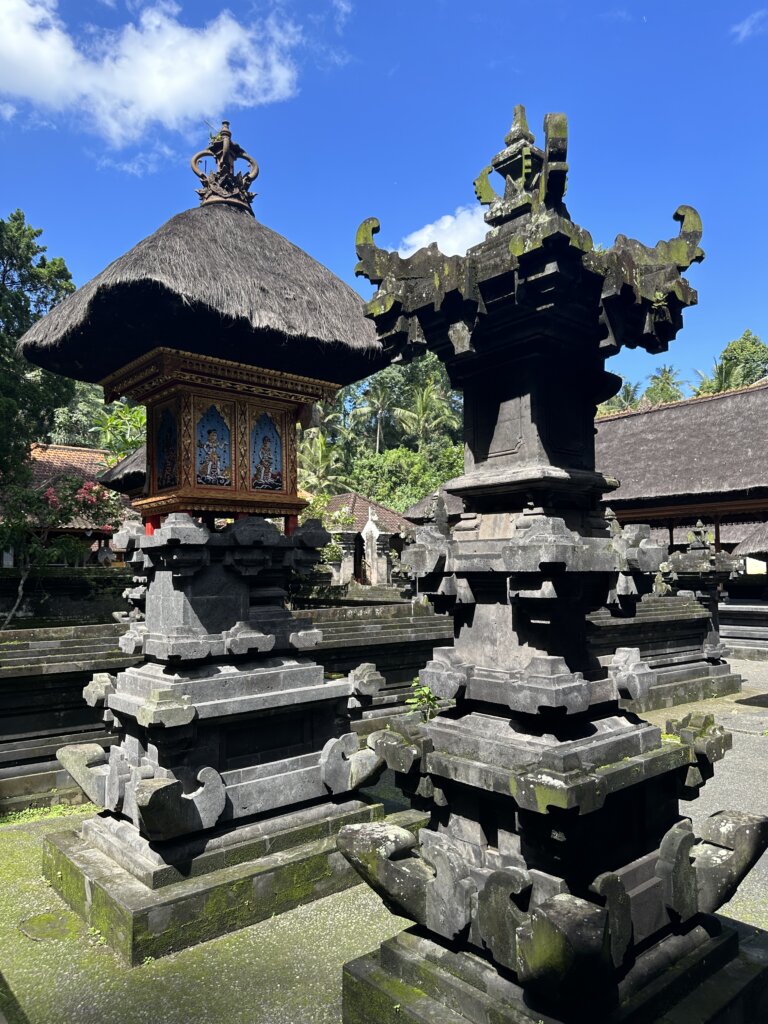
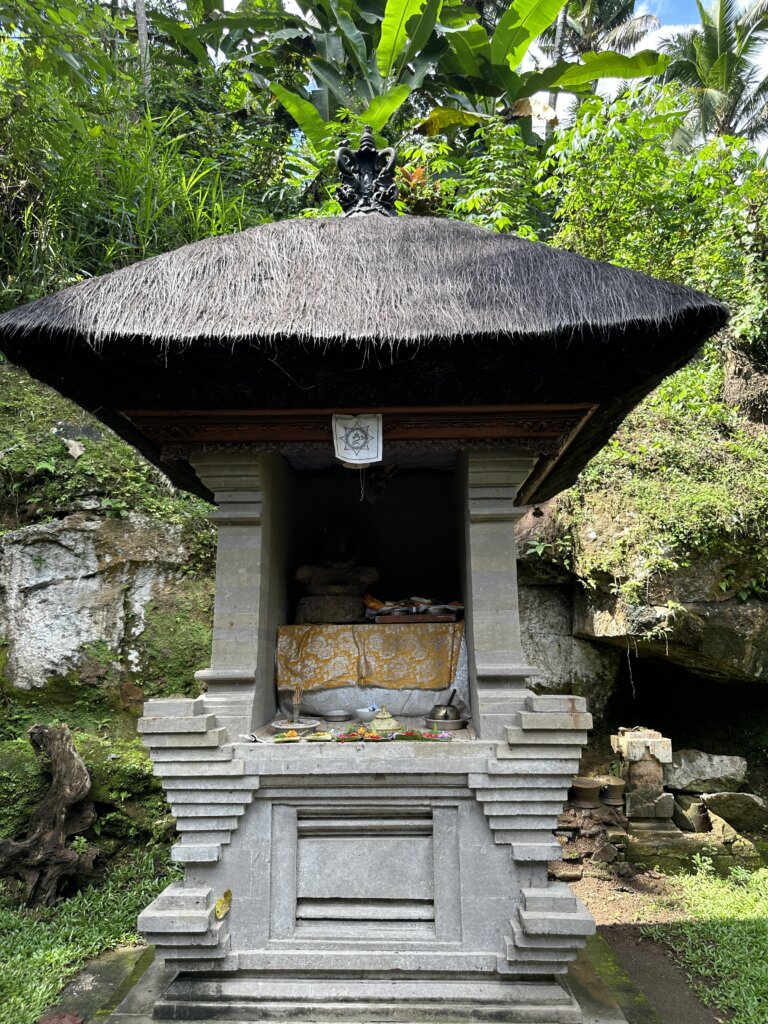
Don’t be surprised when you walk through the streets and see little offerings of flower and food burning in front of temples and houses. Canang Sari is done daily in thanksgiving for peace and seeing a new day. The only exception is when there has been a death, then the family can skip the daily offerings. I found it quite beautiful and touching.
Make sure not to step on these offerings or even carry/touch them. You are allowed to photograph them but be respectful.
3. Vaccination
One of the 20 things to know before visiting Bali, Indonesia is the vaccination rule. At the minute, there is no mandatory vaccination for visitors except you are coming from countries with high yellow fever risk.
I read that Rabies still exists in Bali and it’s not surprising with the amount of stray dogs.While they seemed pretty chill and will avoid humans at all cost (at least, all the ones we encountered), I cannot ignore this. Putu, our guide, mentioned that they are not harmful and there are very few cases of rabies. However, I don’t know if it is possible that all the stray dogs are vaccinated; so I made sure to avoid them.
You could consider getting the vaccination but to be transparent, we did not get any vaccines.
On the topic of health, a mosquito repellent is very important.
4. How to get around Bali
A lot of people hire a motorcycle of moped (both are very popular). It’s also probably the cheapest way to get around. There is a rumour that motorcycle hiring by tourists will be banned due to misbehaviour but I still saw tourists cruising around; so I have no idea when this will happen. In this Bali travel guide, I will focus on hiring a driver.
Hiring a driver in Bali
We did not want to get in trouble or stress about anything so we hired Putu who is Balinese. He was the perfect 3rd wheel; showed us hidden gems and gave us countless history lessons. He picked us up from the airport and dropped us back at the end of our trip. Putu drove us around in the comfort of his car and the cost of the whole week with him was incredibly reasonable.
If you are interested in our lovely driver, Putu, send me an Instagram DM. He is the loveliest guy who doubled as our guide (very knowledgeable and proud of his heritage). We left Bali as friends after we had spent so much time together.
Our hotel also had a free shuttle to and from Ubud’s centre which we used when we wanted a mooch.
Otherwise, download Gojek which is Indonesia’s version of Uber.
5. Can you use your bank card in Bali?
Yes, most establishments will accept cards especially in restaurants. However, cash is still somewhat preferred in more local places like Temples. Even in some popular places, we had to pay cash as so many places still only accept cash. My recommendation is to have some cash just incase.
ATMs are also available around but not always reliable so that is something to note. I used only the ATMs that were connected to major Indonesia banks just to be safe.
6. When is the best time to visit Bali?
The best time to visit Bali is between May and September for guaranteed blue skies. However, don’t expect it to stay dry throughout. It rained when we were there; especially early mornings but cleared up quite quickly.
From October to April is the rainy season and it is equally beautiful especially in Ubud. The green of the rice fields is even more lush, it is generally cheaper and not as busy.
In the rainy season, don’t forget bug sprays for those pesky mosquitos.
7. What to wear in Bali
Bali is very casual when it comes to dressing. There is no need to be super conservative and thanks to the humid weather, you can pack light. Think of outfits with linen and cotton materials; breathable, airy and simple. In the same vein, there is no need to be vulgar in your dressing.
There is a lot of walking as well so comfortable shoes; trainers for steep uneven grounds etc. I wore my flipflops a lot in Bali as it was comfortable and easy to remove each time we had to visit specific Temples. You may need to remove your shoes at the door in some places especially if they are marked as Holy.

When visiting Religious sites like Temples, you have to dress modestly. Shoulders should be covered and skirts should be long. You can carry a scarf or sarong with you so that you can cover up if you suddenly visit a Holy place.
I had a denim jacket with me but never used it because it was just too hot and humid. In general, dressing in Bali is very relaxed and everyone just minds their business.
20 Things to know before visiting Bali: All about Bali Belly
A Bali travel guide would be incomplete without discussing Bali belly. One of my most asked questions was how I was able to avoid Bali belly. Let us start from the beginning.
8. What is Bali Belly?
It is basically diarrhoea causing by contaminated water or food in Bali. People who have had it swear it is the worst thing to have. The good news is that it typically clears up after a few days; however, I knew I had to do everything to avoid it.
I had read so much about the dreaded Bali Belly before my trip so I was prepared not to fall victim. The advice is to drink only bottled water and avoid ice cubes in your drinks – which we did. We also mostly ate at our hotel’s restaurant (thankfully, they had an extensive menu)

How to avoid Bali Belly:
- Wash your hands before eating and each time you get back into your hotel
- Avoid ice in your drinks if unsure where the water is from
- Avoid road side and street hawkers when it comes to food. Only eat in restaurants.
- Drink only bottled water
- Don’t wash your fruits and vegetables with tab water. Use bottled water to wash them
- Use bottled water to brush your teeth as well
This might seem overkill but I was not ready to let Bali belly spoil my trip so I took all precautions. By day 2, you should be used to the “rules” lol.
What should you do if you have Bali Belly?
- Seek medical advice. If you are in a hotel, let the reception know and ask if they have a Doctor to recommend. Or just look for the nearest medical centre. It is a very popular sickness so any medical centre should know what to do.
- Drink plenty of water to replenish what you are losing. This time, bottled water from reputable hotels/restaurants. Also, look for Oral rehydration drinks or you can make yours. 1 litre of boiled or bottled water, 6 teaspoons of sugar, ½ teaspoon salt.
- Avoid alcohol in the mean time and even when you start to feel better. The goal is to let your tummy settle before you go back to any thing that may unsettle it.
- Avoid spicy food. The same goes for spicy food. Eat more bland foods like bread, white rice etc while you wait for the Bali belly to pass.
9. Traffic in Bali
A Bali travel guide has to include the insane traffic in Bali. Bali is always busy. I would have said to avoid peak times but what is peak time in Bali? We went out at 4am and Ubud was alive like nobody had gone to bed the night before. Markets were open, cars were on the roads and it just felt like a city that was awake 24 hours everyday. Traffic can get manic and it is important to leave enough time for any day trips.
I chose to stay in Ubud as many things we wanted to experience were in and around Ubud. The few times we drove out of Ubud, we were on the road for about 2 hours. Oh yes, going from one place to another can be really long.
10. The tourist rules
Bali is one of those places that feels special because it is very cultural yet open to tourists. The Balinese have worked very hard to preserve their culture so they won’t allow tourists mess this up. It goes without saying that you have to be respectful as a traveller and sensible too. In Bali, you will be sent straight to prison if you are caught with any form of drugs. Remember Bridget Jones and the case of Thai prison? That is the reality in Bali too. Only that there won’t be any Mark coming to rescue you.
11. Toilet Etiquette
In Bali, you are not supposed to flush tissue down the toilets. There is usually a bin for tissues and I will admit that I found this very difficult to adhere to. I have only started travelling to Asia quite recently and noticed that this is a thing there. Possibly due to the drainage system and how it functions? I love that the toilets had bidets though; it’s not common in the UK so this was something I found quite cool.
12. About Bali locals
One of the 20 things to know before visiting Bali is the kindness you will experience.
I had heard about the kindness of Balinese people but I was not prepared for just how lovely they are. Our experience in Bali was already so magical but then add the loveliness of the Balinese and I’d say the trip was epic. Everybody is incredibly kind and willing to share a story with you. They are very proud of their culture and will engage in every conversation about something you’ll find fascinating. I don’t think I will ever get over how lovely they are. We stayed in Ubud so my experience is very specific to that area. But I cannot imagine it is too different from other places in Bali.
13. Unethical/Wildlife experiences in Bali
All around Bali, you will see unethical wildlife experiences and it’s something that seems to be a booming market. In front of Temples, there were snake charmers charging a fee to pose with snakes for photos. On a closer look, I noticed the snakes had their mouth taped together. I don’t know much about snakes but surely, that can’t be ethical, can it?!
There’s the popular luwak coffee which is one of Bali’s exports. Upon further research, I read how the luwaks are bred in the most horrible environments just so they can produce more poo for the coffee. Don’t get me started on the phoney elephant sanctuaries.
I cannot claim to be the most ethical traveller but what I try to do is point out and avoid what I think might be unethical. Of course, we are all still learning so I will make mistakes from time to time. However, this is where you have to do your research.
14. Public Holidays in Bali
The great thing about Bali is that although they have some traditional public holidays, they won’t affect your travel too much. However, the one to watch out for is Nyepi which is a day of silence. This usually marks the beginning of the New year for the Balinese. For 24 hours, you are expected to be indoors. The belief is that evil spirits abound will believe the island is departed and stay away for the year.
Tourists can move around their hotel room and resorts. You are just not allowed to go outside of your accommodation.
Galungan is another popular public holiday but this one is festive. It celebrates the victory of good over evil. There is no movement restriction during this one and you are encouraged to join in the festivities.
15. Where to go in Bali
For first timer’s, Seminyak, Ubud and Canggu are more popular for tourists (especially Canggu and Seminyak). Where to go in Bali will also be determined by how long you have on the island. These 3 areas have the most amount of accommodation, infrastructure for tourists etc.
Of the 3, I will always recommend Ubud as I think it is still quite authentic Bali. I find it more perfect for slow travel which we associate with Bali living. Also, it is more affordable than Seminyak for example and is a lot quieter too. I have written a Bali travel Guide on the best things to do in Ubud.
Uluwatu is cute as well and is know as a surfing destination if that is your thing.
16. Food in Bali
This is one of the best things about Bali. Bali is foodie heaven. Although I’ll be the first to admit that I’m not quite a foodie, the food in Bali is amazing. We could not stop eating and it did not help that our hotel had a restaurant, Deeva Bali. The no 1 thing to eat is Nasi Goreng which is fried rice, the Indonesian way. My favourite food was Nasi Goreng Rendang which is the fried rice with beef. Other foods to try are Mie Goreng (noodles) and Nasi Campur which is mixed rice, eaten with vegetables or curry.
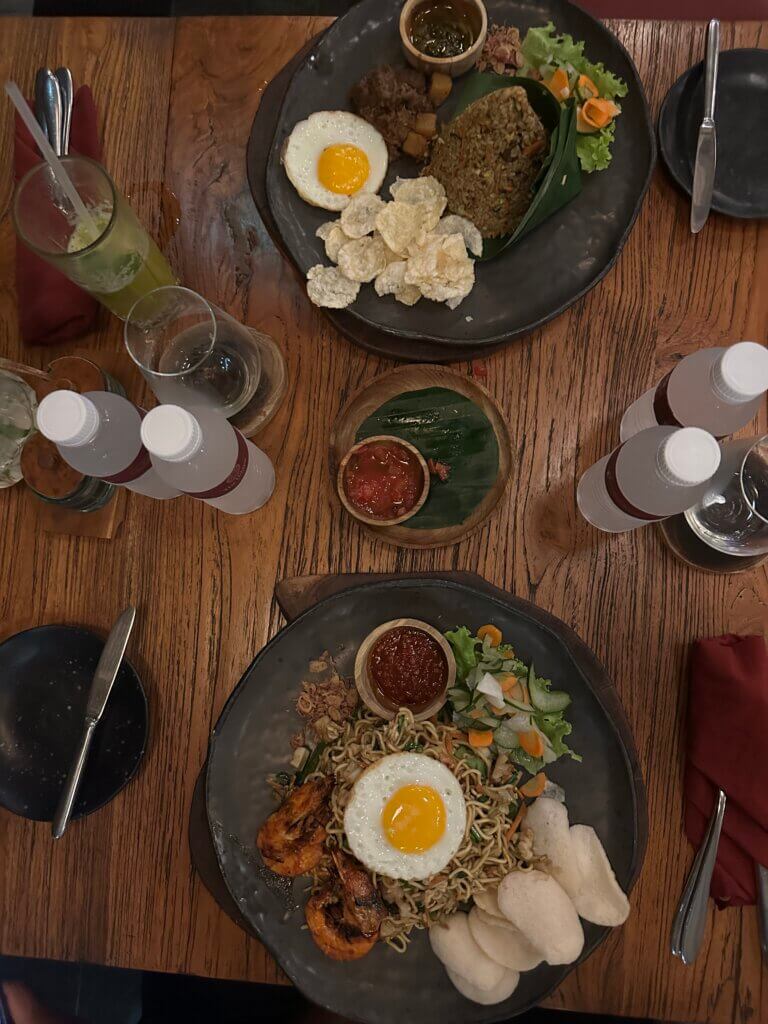
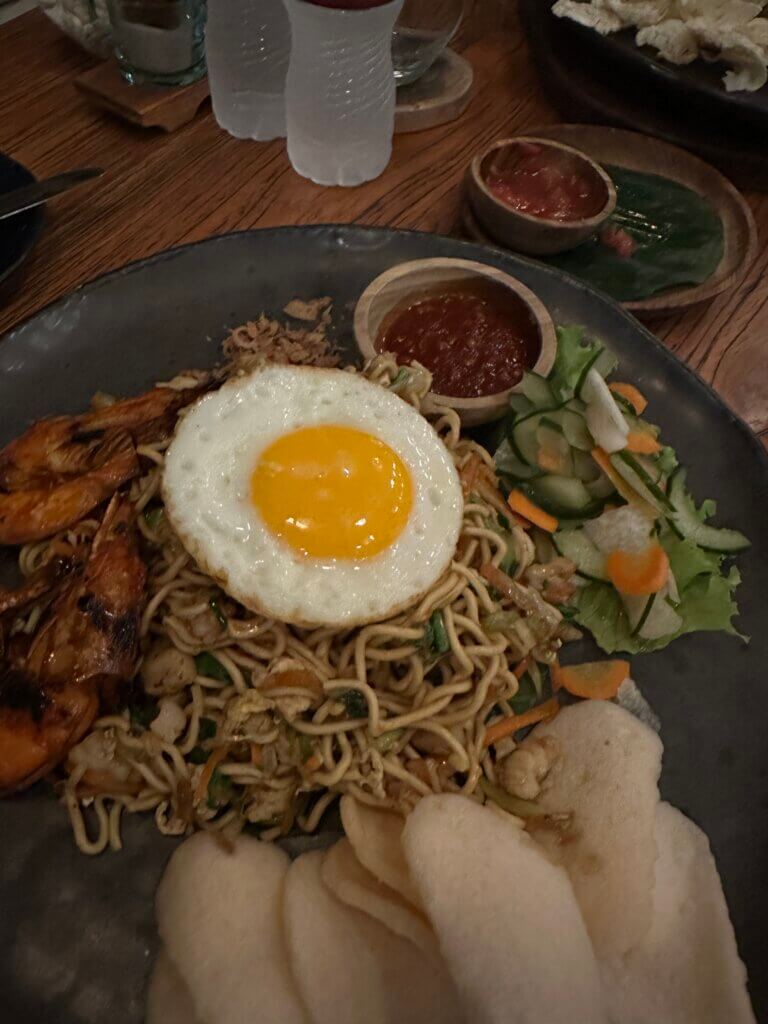
Babi Guling is another really popular meal. It is basically spit roasted pig; which is interesting because Indonesia is predominantly Muslim. However, Bali is almost like its own world with most of its inhabitants being Hindu.
17. Can I travel to Bali with my partner?
A Bali travel guide won’t be complete without discussing the “rule” around travelling with your partner. I understand that with some Asian countries, travelling with your partner while not married is frowned upon. This is not the case in Bali. Bali is romance heaven and nobody cares who you are lodging with.

18. How expensive is Bali?
I found Bali really cheap. One thing I will say is that cheap is relative and sometimes, degrading to a location; but for the sake of this question, “cheap” will translate to “reasonably priced”. A lot of my travel friends have confirmed that Bali is getting more expensive. So I can only imagine that it was like dirt cheap before the mass tourism. However, Bali is still relatively affordable and can be done on even the tightest budget.
Food is particularly cheap and even our hotel was not as expensive for a luxury hotel. In comparison to a lot of places we have travelled to, we found Bali quite cheap.
19. Is Bali Child friendly?
This is another one of my favourite questions lol. Disclaimer: we did not go to Bali with our toddler as this was a recharge trip for us as parents. However, it is normal that I will always look for child friendly things subconsciously lol. The Bali we experienced was not child friendly; only because we enjoyed the grown up side of things. We saw lot of families (even in our hotel), lots of activities geared towards kids etc. But to enjoy the gems in Bali, I think it would be too much for babies and toddlers. Bali might be one for older kids who appreciate nature more.
RELATED BALI POSTS:
THE BEST THINGS TO DO IN UBUD BALI
GUIDE TO VISITING LEMPUYANG TEMPLE
THE MOST BEAUTIFUL HOTEL IN UBUD BALI
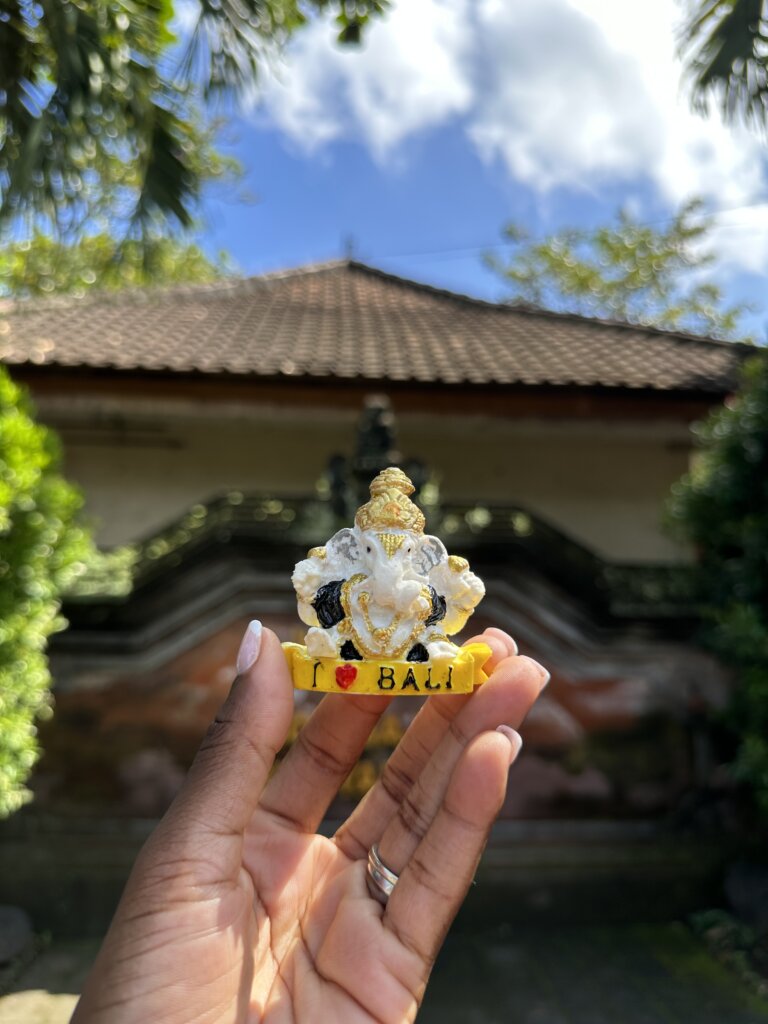
Bali Travel Guide: 20 Things to know before visiting Bali
20. The ultimate question: Is Bali worth it?
I have seen so many write-ups about Bali being overrated and how it is no longer worth it. This is absolutely trash without mincing words. I always say that there is a reason why some places are more popular than the others. Bali is absolutely beautiful and worth a visit. For a more authentic experience, you can tailor your experience to more remote parts of the island. It is very much worth it and if you get the chance to go, Just Go!
Bisous, Bugo x







information that no-one else has mentioned. thank you <3